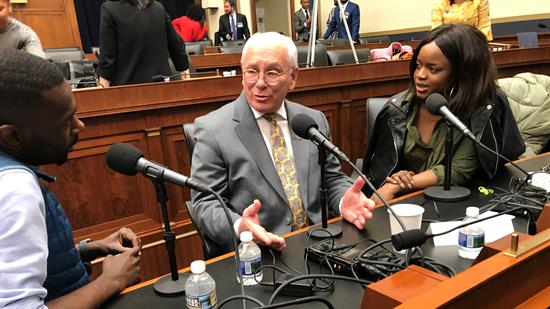- Home
- About
-
Constituent Services
- Academy Nominations
- Community Project Funding
- Congressional Art Competition
- Congressional App Challenge
- Congressional Commendation
- Event Invitation
- Grants
- Help with a Federal Agency
- Internships
- IRA Clean Energy Consumer Benefits
- Know Your Rights: Immigration
- Request a Meeting
- Request Surplus Books
- Presidential Greeting
- Visit Washington D.C.
- Issues & Legislation
- News
- 20th District
- Contact

Press Releases
Tonko Announces $1.1 Million+ Federal Investment in Semiconductor Research at RPINSF funding from CHIPS and Science Act to support workforce development, research on new high-conductivity materials for semiconductors
Troy, NY,
September 22, 2023
TROY, NY — Congressman Paul D. Tonko today announced the awarding of $1,186,000 from the National Science Foundation’s (NSF) Future of Semiconductors (FuSe) program to Rensselaer Polytechnic Institute (RPI) to support research on the synthesis and integration of new high-conductivity materials in computer chip manufacturing. This funding, made possible by the CHIPS and Science Act Tonko helped champion, will also support a multifaceted education and workforce development initiative designed to increase the diversity, quality, and quantity of the semiconductor chip manufacturing workforce in the Capital Region and across the nation. “The success of our CHIPS and Science Act depends on our nation’s ability to educate and train the next generation of workers in the critical semiconductor industry,” Congressman Tonko said, “and I’m thrilled to celebrate this significant federal investment that will further entrench our Capital Region’s status as a global leader in high-tech innovation. This infusion of funding will keep RPI on the cutting edge of research in the semiconductor field, all while supporting workforce development programs that ensure that a diverse, talented array of workers is ready to take on the good-paying jobs this industry will continue to create in our region and beyond. I’m proud of my efforts to bring the CHIPS and Science Act to fruition, and I’ll continue pushing for legislative action and federal investments that deliver for American workers, consumers, and communities.” “I am particularly excited about this grant because it supports our work that simultaneously addresses multiple important challenges in the U.S.,” said Professor Daniel Gall, Principal Investigator on the project. “The fundamental research on new materials for more energy-efficient computer chips will help to reduce global warming, the educational initiatives will grow the workforce for semiconductor manufacturing and bring important manufacturing jobs back to the USA, and our collaboration with Historically Black Colleges and Universities and Minority Serving Institutions hopes to address racial disparities in education and the technological workforce. This competitively awarded grant is another sign of RPI’s leadership in research and engineering education and of the importance of New York’s Capital District for the future of the semiconductor industry.” During negotiations in Congress on the CHIPS and Science Act last year, Tonko successfully pushed alongside his colleagues in the House to prioritize and secure a $52 billion investment in domestic manufacturing that will help grow jobs here in the Capital Region. He also successfully advocated for the inclusion of the Micro Act, legislation that will invest in research and development for the next generation of semiconductor technologies. This project, entitled “Interconnects with Co-Designed Materials, Topology, and Wire Architecture,” focuses on the synthesis of new materials which have a high electrical conductivity for small wires. These materials are critical because more powerful and energy-efficient computers require smaller wires to connect transistors and memory elements. This investment will allow RPI to discover such new materials and develop methods for their synthesis and integration in the semiconductor manufacturing process, enabling the production of more powerful and energy-efficient computer chips that can be used in a wide range of devices, from cell phones to large data processing centers. Additionally, the project includes a workforce development initiative involving education leaders from HBCUs and Minority Serving Institutions, top scientists from research universities, and development engineers from private semiconductor firms, with the goal of bolstering diversity and capability in the U.S. chip manufacturing workforce. Other institutions participating in this project include Cornell University and the University of Notre Dame, which received federal investments of $354,000 and $360,000, respectively. Today’s announcement comes as part of a series of investments in 24 research and education projects through 61 awards to 47 institutions across the nation, with a total investment of $45.6 million. These awards, which include funding from the CHIPS and Science Act, are also supported in part through public-private partnerships between FuSe and semiconductor manufacturers including Ericsson, IBM, Intel, and Samsung. Taken together, these projects will help to support the development of new technologies and accelerate the transition of those innovations to the market, all while preparing America’s semiconductor workforce through practical research experience. |
